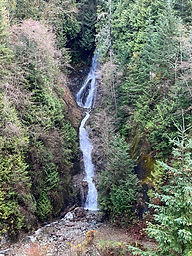Village Residents eager to share their thoughts

Residents from all corners of the Village converged on Council Chambers Thursday night as the long-awaited first step to addressing parking, traffic noise and watershed protection got underway. Attendees from Brunswick Beach, Kelvin Grove, Mountain and Sunset drives and even from the heart of the Village came out to discuss their concerns.
Mayor Ken Berry began by welcoming residents to an informal task force seeking to consult with residents to find solutions to ongoing problems with highway noise and parking. He said he hoped for recommendations that council and staff could implement prior to the start of the summer 2024 hiking season. He also noted that in future, the two task forces would be held on different nights to accommodate residents who would like to attend both.
After his initial remarks, Berry moved to a round of introductions, and asked for people's concerns right up front. The group was then split in two, with the parking discussion led by Berry, and the traffic noise contingent by Councillor Michael Broughton. Councillor Neville Abbott also was present, joining the group of residents debating the concerns and questions around parking.
Both parking (and the attendant issues of fire danger and watershed protection) and traffic noise are concerns of long-standing in Lions Bay, and each group gave residents an opportunity to air their views and share their concerns. Those present included forty-year residents, whose grassroots initiative to address parking and watershed protection was profiled earlier this week, and long-term villager Greg Weary, who has spoken to Council multiple times in recent months over his concerns regarding the noise and carnage associated with unchecked speeding along the Sea to Sky corridor.
Berry's group of fifteen residents held a lively discussion addressing the many and varied concerns that have sprung up around parking in the Village in recent years, from late-night partying in Kelvin Grove, to hundreds of unwanted vehicles making U-turns in the driveways of Brunswick Beach homes, to the traffic jams created by thousands of hikers seeking parking near the trailheads over the summer months.
By way of explanation, Abbott offered a little municipal governance history. He said that the explosion of hikers that came with the Covid shutdowns in 2020 led the council of the day to formulate a solution they only ever viewed as short-term; to collect parking fees from visiting hikers with a view to covering the costs of enforcement. At the time, it was expected that as the pandemic waned, so would the need to find parking for hikers. However, he noted that the numbers, which reached well over 10,000 per month last summer, mean it has become clear this is an issue requiring a long-term solution. It was also mentioned later in the meeting that a cost-benefit analysis is currently underway with regard to the costs of issuing parking tickets vs the revenue generated.
A number of possible solutions were suggested including the initiative that would send parking to the gravel pit and redirect hikers along a route that bypasses the village water intake. As the discussion progressed, it became clear that perspectives varied between neighbourhoods. But as these differences became apparent, Teresa Brandvold offered a sobering thought. "We need to take a giant step back and stop thinking about our individual streets," she said. "What will happen to house values throughout the Village if the watershed is impacted long term?"
Next door, a smaller group of six residents led by Broughton addressed the issues that arise from traffic that travels through the village along Highway 99 without regard for posted speed limits, as well as some of the solutions they'd like to see. "For the highway group, I feel it was a good start," said one of the participants. "Ideas got a bit too into the weeds and details, but at the end of the day, it was good to be a part of the community, contributing and hearing from others."
While other participants expressed similar frustration with the format after the event, feedback was generally positive. "It was great to see so many neighbours coming together to collaborate on a plan to make the 2024 summer season better for both residents and visitors," one resident noted. "It's not easy to herd a group of cats like that, but for the most part they seemed to manage it," said another.
Criticisms seemed more directed at the speed and nature of the process rather than the aims of the taskforces themselves. "We went over ground I've covered in emails many times before," said one participant in the parking group. "For things to get done, we need to identify common goals."
A participant in the traffic group expressed similar concerns. "We know what the problem is, no need to restate it." But by the end of the evening, most residents seemed intent on finding a way forward.
No date has been announced for the next meetings, so interested residents were told to stay tuned, and attend if they can. In the meantime, volunteers are still needed to help spread the word of their initiative, and encourage interested residents to contact them at lbparkingvolunteers@gmail.com .
Have thoughts to share? Leave a comment below or email The Watershed at editor@lionsbaywatershed.ca


Comments